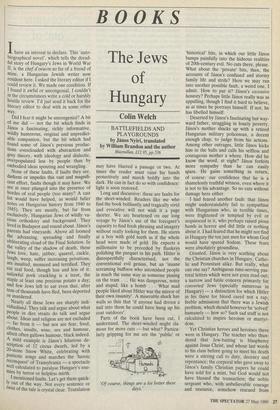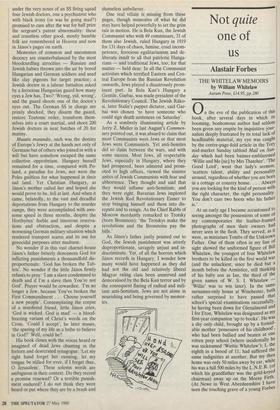BOOKS
The Jews of Hungary
Colin Welch
BATTLEFIELDS AND PLAYGROUNDS by Janos Nyiri, translated by William Brandon and the author
Macmillan, £12.95, pp.536
Ihave an interest to declare. This 'auto- biographical novel', which tells the dread- ful story of Hungary's Jews in World War II, is the chef d'oeuvre so far of a friend of mine, a Hungarian Jewish writer now resident here. I asked the literary editor if I could review it. We made one condition. If I found it awful or uncongenial, I couldn't in the circumstances write a cold or harshly hostile review. I'd just send it back for the literary editor to deal with in some other way.
Did I fear it might be uncongenial? A bit of me did — not the bit which finds in Janos a fascinating, richly informative, wildly humorous, original and unpredict- able companion, but the bit which had found some of Janos's previous produc- tions overclouded with abstraction and grey theory, with ideology and dialectic, overpopulated less by people than by embodied ideas spouting and wrangling.
None of these faults, if faults they are, darkens or impedes this vast and magnifi- cent effort, faults though it may have. We are at once plunged into the presence of hordes of real people (too many? A cast list would have helped, as would fuller notes on Hungarian history from 1940 to 1945). They are mostly, but far from exclusively, Hungarian Jews of wildly va- rious orthodoxy and background. They lived in Budapest and round about. Janos's parents had vineyards. Above all loomed the advancing, spreading and finally obliterating cloud of the Final Solution. In the valley of the shadow of death, these Jews love, hate, jabber, quarrel, cackle, laugh, weep, suffer increasing privations, are insulted, menaced and terrified. They eat real food, though less and less of it: unlawful pork crackling is a treat, the staple at least one precious potato a day; and few Jews left to eat even that, after tens of thousands have fled, been deported or murdered.
Nearly all these Jews are sharply indi- vidualised. They talk and argue about what people in dire straits do talk and argue about. Ideas and religion are not excluded — far from it — but nor are fear, food, clothes, insults, wine, sex and humour, albeit often gallows humour, black indeed. A mild example is Janos's hilarious de- scription of 12 circus dwarfs, led by a 20-stone Snow White, celebrating with patriotic songs and marches the 'heroic reconquest' of Transylvania — a spectacle well calculated to paralyse Hungary's ene- mies by terror or helpless mirth. I mentioned faults. Let's get them quick- ly out of the way. Not every sentence or twist of the tale is crystal clear. Translation
may have blurred a passage or two. At times the reader must raise his hands protectively and march boldly into the dark. He can in fact do so with confidence: light is soon restored.
Long and discursive: these are faults for the short-winded. Readers like me who find the book brilliantly and tragically vivid and evocative will not wish it a page shorter. We are heartened on our long voyage by Janos's use of the foreigner's capacity to find fresh phrasing and imagery without really looking for them. He stares at a boy with gold teeth as if the whole head were made of gold. He expects a millionaire to be preceded by flunkeys polishing the parquet in his path. Hitler is disrespectfully characterised, not the conventional evil genius, but an 'insane screaming buffoon who astonished people in much the same way as someone pissing on the tram . . . He was dangerous, noisy and stupid, like a bomb . . . What mad people liked about Hitler was the mirror of their own insanity'. A miserable shack has walls so thin that 'if anyone had driven a nail into them he could have hung up his coat outdoors'.
Parts of the book have been cut, I understand. The short-winded might cla- mour for more cuts — but what? Particu- larly gripping for me are the 'public' or 'Of course, things are a lot better these days.' 'historical' bits, in which our little Janos bumps painfully into the hideous realities of 20th-century evil. No cuts there, please. What about the 'private' bits, then, the accounts of Janos's confused and stormy family life and strife? Here we may run into another possible fault, a weird one, I
admit. How to put it? Janos's excessive honesty? Perhaps little Janos really was as
appalling, though I find it hard to believe, as at times he portrays himself. If not, he has libelled himself.
Deserted by Janos's fascinating but way- ward father, struggling in lonely poverty, Janos's mother shacks up with a retired Hungarian military policeman, a decent enough chap, to judge from his actions.
Among other outrages, little Janos kicks him in the balls and calls his selfless and courageous mother a whore. How did he know the word, at eight? Janos forfeits more sympathy than he can easily spare. He gains something in return, of course: our confidence that he is a shamelessly truthful witness, even where it is not to his advantage. So no cuts without damage here either.
I had feared another fault: that Janos might understandably fail to sympathise with Hungarians who, in terrible times, were frightened or tempted by evil or acquiesced in it, who perhaps raised pious
hands in horror and did little or nothing about it. I had feared that he might not find in Hungary the ten just men for whom God would have spared Sodom. These fears were absolutely groundless.
Granted, Janos is very scathing about the Christian churches in Hungary, Catho- lic and Protestant alike. But really, what can one say? Ambiguous time-serving pas- toral letters which were not even read out; a narrow and futile concern primarily for
converted Jews (specially numerous in Hungary) — a distinction for which Hitler
in his thirst for blood cared not a rap; feeble admissions that there was a Jewish problem, which should however be 'solved' humanely — how so? Such sad stuff is not calculated to inspire heroism or martyr- dom.
Yet Christian heroes and heroines there were in Hungary. The teacher who thun- dered that Jew-baiting is blasphemy against Jesus Christ, and whose last words to his class before going to meet his death were a stirring call to duty, decency and repentance; the corporal who gave away to Janos's family Christian papers he could have sold for a mint, but God would not have blessed the transaction; the noble sergeant who, with unbelievable courage and resource, somehow rescued from under the very noses of an SS firing squad four Jewish doctors, one a psychiatrist who with black irony (or was he going mad?) promised to cure after the war for half price the sergeant's patent abnormality: these and countless other good, mostly humble folk are remembered in Heaven and now in Janos's pages on earth.
Memories of common and uncommon decency are counterbalanced by the most bloodcurdling atrocities — Russian and Jewish babies thrown into the air by bored Hungarian and German soldiers and used like clay pigeons for target practice; a Jewish doctor in a labour battalion asked by a ferocious Hungarian guard how many eyes a Jew has. Two? 'Wrong, yid, wrong', and the guard shoots one of the doctor's eyes out. The German SS in charge are primly shocked, they disarm the guard, restore Teutonic order, transform them- selves into a court martial, and shoot 200 Jewish doctors in neat batches of 20 for mutiny.
Mutatis mutandis, such was the destiny of Europe's Jewry at the hands not only of Germans but of others who joined in with a will but have somehow escaped the same collective opprobrium. Hungary herself remained for a time, compared with Po- land, a paradise for Jews, nor were the Poles guiltless for what happened in their sad land. Yet Christian Hungary, as Janos's mother called her and hoped she would prove to be, fell at last. And when it came, belatedly, to the vast and dreadful deportations from Hungary to the murder camps, they were accomplished with awe- some speed in three months, despite the Horthyites' feeble and timorous reserva- tions and obstruction, and despite a worsening German military situation which rendered transport scarce and its use for genocidal purposes utter madness.
No wonder if in this vast charnel-house Janos's father bitterly denounces God for inflicting punishments a thousandfold dis- proportionate: 'God has broken the Tab- lets'. No wonder if the little Janos firmly refuses to pray: 'I am a slave condemned to death and if I'm a slave then You're not God'. Prayer would be cowardice. 'I'm no longer a Jew, because You've broken the First Commandment . . . Choose yourself a new people'. Contemplating the corpse of a murdered friend, little Janos cries, `God is wicked. God is mad' — a blood- freezing variant of Christ's words on the Cross. 'Could I accept', he later muses, `the sparing of my life as a bribe to believe in God?' Well, could he?
His book closes with the voices heard or imagined of dead Jews chanting in the forlorn and desecrated synagogue: 'Let my right hand forget her cunning, let my tongue be stilled for ever, if I forget thee, O Jerusalem'. These solemn words are ambiguous in their context. Do they record a promise renewed? Or a terrible punish- ment endured? I do not think they were heard or put where they are by a brash and shameless unbeliever.
One real villain is missing from these pages, though memories of what he did may have helped powerfully to set the grim tale in motion. He is Bela Kun, the Jewish Communist who with 49 commissars, 31 of them also Jewish, ruled Hungary in 1919 for 131 days of chaos, famine, cruel incom- petence, ferocious egalitarianism and de- liberate insult to all that patriotic Hunga- rians — and traditional Jews, too, for that matter — held dear. In all the Communist activities which terrified Eastern and Cen- tral Europe from the Russian Revolution onwards, Jews played a disastrously prom- inent part. In Bela Kun's Hungary a Gentile, Garbai, was made president of the Revolutionary Council. The Jewish Rako- si, later Stalin's puppet dictator, said Gar- bai was chosen 'to have someone who could sign death sentences on Saturday'.
As a sombrely illuminating article by Jerry Z. Muller in last August's Commen- tary pointed out, it was absurd to claim that most Communists were Jews or that most Jews were Communists. Yet anti-Semites did so claim between the wars, and with some success. Most Jews, all respectable Jews, especially in Hungary, where they had prospered, been admired and prom- oted to high offices, viewed the sinister antics of Jewish Communists with fear and abhorrence. They thought and said that they would inflame anti-Semitism; and they were right. Bavarian Jews implored the Jewish Red Revolutionary Eisner to stop bringing himself and them into dis- repute and to resign. As the Chief Rabbi of Moscow mordantly remarked to Trotsky (born Bronstein): 'the Trotskys make the revolutions and the Bronsteins pay the bills.'
As Janos's father justly pointed out to God, the Jewish punishment was utterly disproportionate, savagely unjust and in- discriminate. Yet, of all the horrors which Janos records in Hungary, I wonder how many would have happened as they did had not the old and relatively liberal Magyar ruling class been unnerved and demoralised by the Bela Kun terror and by the consequent flaring of radical and mili- tant anti-Semitism. Jews are not alone in nourishing and being governed by memor- ies.



















































 Previous page
Previous page